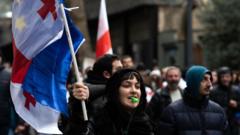Georgia finds itself in a state of escalating turmoil as Mikheil Kavelashvili, a former Manchester City footballer and current member of the ruling Georgian Dream party, is expected to be appointed president this Saturday amid ongoing pro-European Union protests. The protests, which erupted following October's controversial elections, intensified when the government announced plans to halt EU accession negotiations until 2028, igniting discontent among a population largely supportive of EU integration.
Kavelashvili’s election process is highly contentious, with four main opposition groups refusing to recognize the vote and participating in parliamentary activities. They claim widespread election fraud, leading to a principle conflict within the parliament. Outgoing president, Salome Zourabichvili, has labeled Kavelashvili's election a "travesty" and insists her presidency represents the only legitimate institutional authority remaining in Georgia.
Prime Minister Irakli Kobakhidze has dismissed Zourabichvili's stance, asserting that the state institutions are robust enough to handle the current political climate and implying that she will not maintain any significant influence after her term ends on December 29. Meanwhile, government-affiliated officials argue that the discontent is misdirected and that opposition parties are operating under foreign influence.
The recent protests have increasingly drawn participation from diverse sectors, including professionals from IT, the public sector, and the arts, who emphasize the importance of reverting to a legal state that prioritizes constitutional and human rights. Notably, Kavelashvili has distanced himself from the opposition, labeling them as a "fifth column" and criticizing Zourabichvili as a "chief agent" for foreign powers.
The ruling party, founded by billionaire Bidzina Ivanishvili, faces accusations of steering Georgia back into Russia's orbit. The growing international concern has prompted the European Union and the United States to condemn the government's actions, with hundreds of protesters reportedly detained or facing police brutality. Civil activists have faced increasing harassment, and calls for international sanctions against Georgian officials have mounted.
The political climate remains volatile, with the upcoming vote expected to provoke further anti-government protests. As crowds gather around Tbilisi's parliament, demonstrators continue to demand a legitimate and democratic pathway towards EU integration, critical of what many see as a regression to authoritarian rule.



















